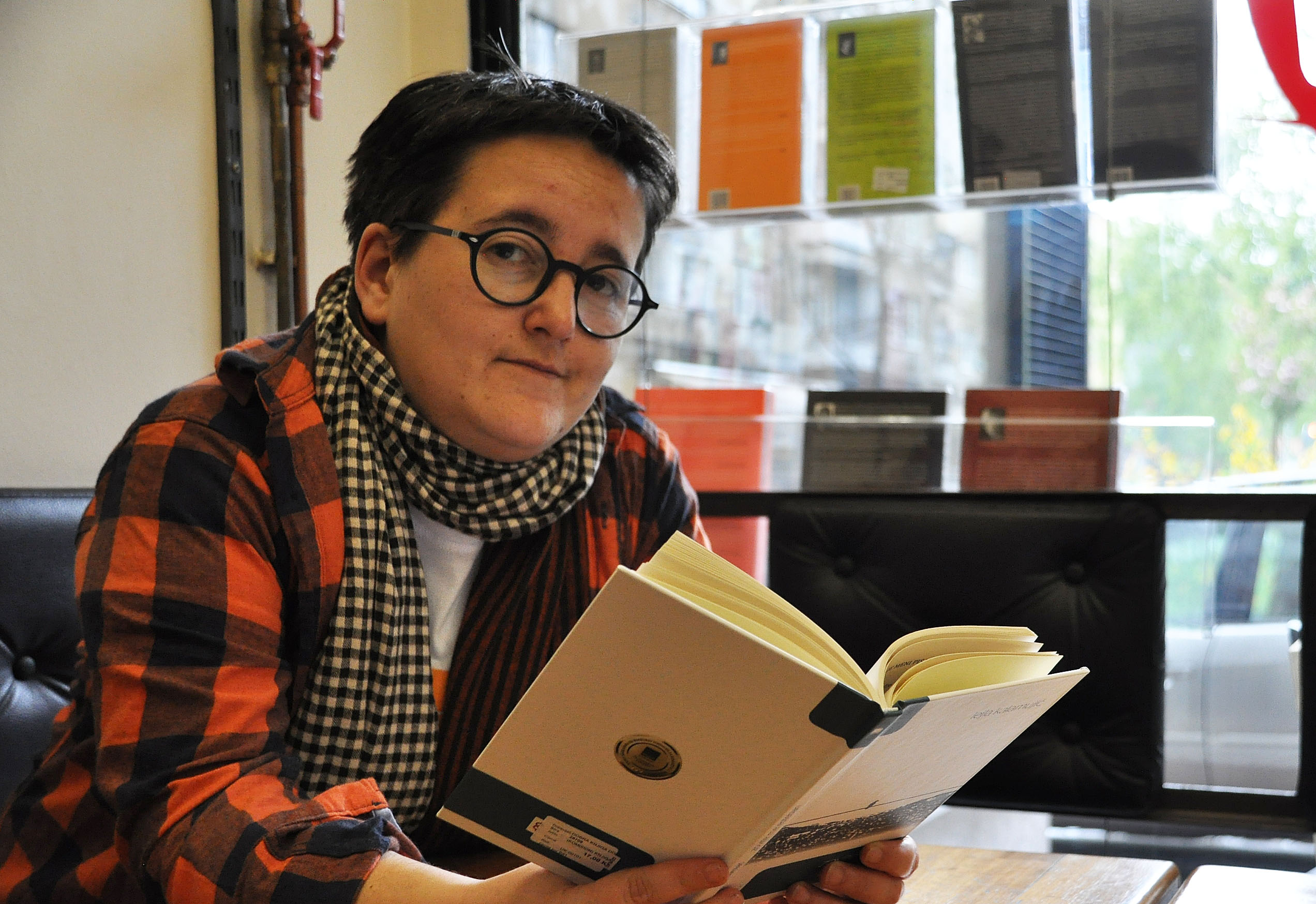Who are you? To whom do you belong? Lejla Kalamujić’s book inspired by the early death of her mother touches the hidden war wounds of Sarajevo and Bosnia.
Lejla Kalamujić is standing in front of the shelf and flips through the pages of her book „Call me Esteban“. „Buybook“ is her favorite bookshop in Sarajevo, the capital of Bosnia. But „Buybook“ also connects three major places in Kalamujić’s life: Bare, Vratnik and Grbavica. Lejla’s mother is buried at Bare cemetery. Vratnik is the neighborhood she grew up in with her father before the war. Grbavica is the neighborhood she stayed during the war and lives in today with her girlfriend Naida. In the middle of these three places – about two kilometers to each side – lies „Buybook“. Each place tells a story about Lejla. Bare is connected with death. Vratnik with war. Grbavica with war and sexuality. Just like „Buybook” brings together the places, „Call me Esteban“ brings together the stories attached to them. The book was nominated for the European Union Literature Award in 2016.
The front door rings a bell each time someone enters the bookshop. The checkout makes shrill noises. Lejla turns a few pages. „Who are you? To whom do you belong?“ Kalamujić asks in the story „The Four Seasons“ – one of 19 short stories in the book. Her stories are like paths that cross each other. But Kalamujić is not interested in rushing down the paths. She wants to shed light on them. Step by step. Patiently. Looking closely. The starting point of her journey: one of the largest cemetaries in Europe.
33 hectares of silence – and a woman in a red rain jacket. Lejla is looking for the grave of her mother. It is not an easy search. It is raining and the paved path winds through the vast cemetary like a hiking trail through rolling hills. More than 60.000 people – one-fifth of the city’s current population – are burried at the Bare cemetery. Kalamujić, holding an umbrella above her head, looks to the right, walks a few steps to the left, turns, looks again, and then points to one section in this vast piece of land 50 times the size of a football field. „Here it is,“ she says. Lejla walks towards the grave. It is marked by a white stone the shape of a trifolitae flower. „Snežana Kalamujić, 1960 – 1982.” Her mother died of a sudden heart attack four days after Lejla’s second birthday.
As a child Lejla came here every Saturday with her grandparents. When the siege of the city began in April 1992, that routine, like most routines in Sarajevo and Bosnia, came to a halt. When the siege ended in 1996, the world had changed and Lejla came to the cemetery only every once in a while.
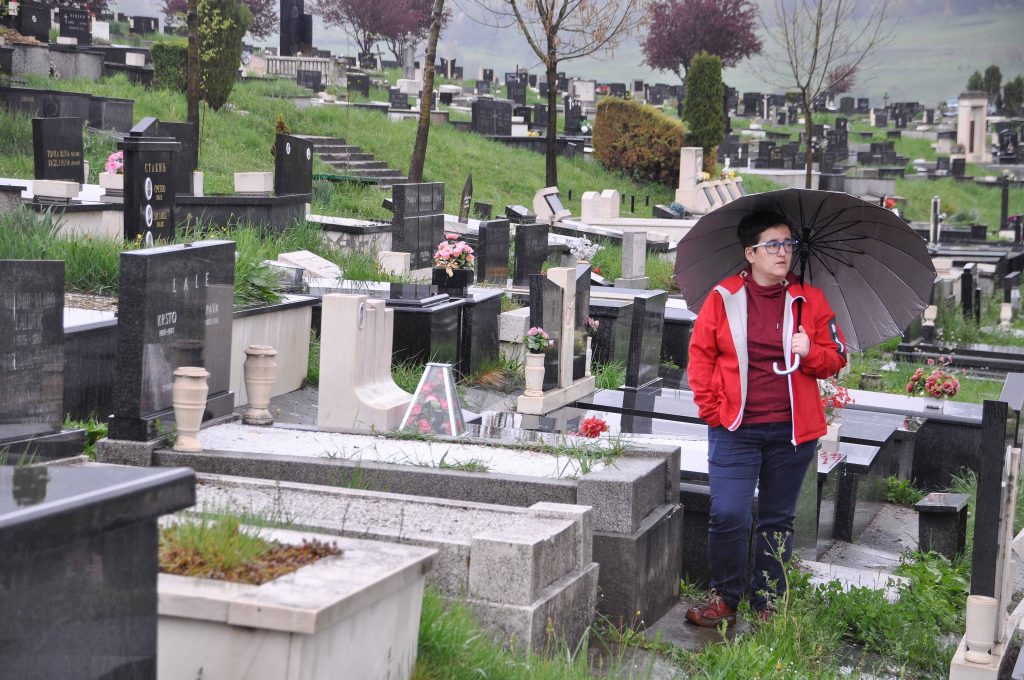
„I am standing in front of her grave at an age my mother has never lived through herself,“ Lejla writes in the story „Return to the Stars”. A 37-year-old woman at the grave of her mother who lived for only 22 years. In her story „What is a Typewriter to me?” Lejla writes: „My life contains no memories of my mother. […] While my peers fell asleep to fairy tales, I listened to tales about her.“
Kalamujić’s mother was a typist. As a child, Lejla would bug her grandparents to get the typewriter out of the bedroom closet. Fascinated by the clacking noise of the letters hitting the paper, the ink and the lever sending back the cylinder to the beginning she would type until her fingers hurt. „Was it then that I fell in love with writing? I don’t know. But I know that I loved to type up the short scenes and episodes from her life,“ Lejla continues in „What is a Typewriter to me?” But Lejla does not remember her grandparents’ apartment only because of her mother’s typewriter. As a child Lejla visited her mother’s parents every weekend at their apartment in Grbavica. But when the war hit Sarajevo, the apartment became more than just a place to visit. It became a waiting room in a divided city.
August 16th, 1994. It was Lejla’s 14th birthday. She had been waiting for two months to cross the bridge to see her father on the other side of the city. She carried a bag with two photoalbums and clothes. It was a sunny day. The few remaining trees on this side of Sarajevo provided some rare shade. To cross the bridge to the other side of the city Lejla took about sixty steps.
Kalamujić’s father had sent her to the apartment of her maternal grandparents in Grbavica two years earlier. After the war had broken out in April 1992, he thought that Grbavica was saver than Vratnik – the neighborhood Lejla had grown up with him. As the fighting got more intense, Lejla and her grandparents left Grbavica and went to Šid (present-day Serbia) – the home region of her grandparents. But in June 1994, during a short period of cease-fire, they went back to Sarajevo hoping that the war has come to an end. Lejla wanted to get back to Vratnik where her father and his parents lived as soon as possible. But the situation in the city had changed. Serbian paramilitary forces had occupied Grbavica during the siege. Nobody was allowed to move without permission. After two months of waiting, the Serbian forces knocked on the door of the apartment and gave Lejla a present on her 14th birthday – a cynical one. „You are allowed to leave. You have 15 minutes to get ready,“ they said.
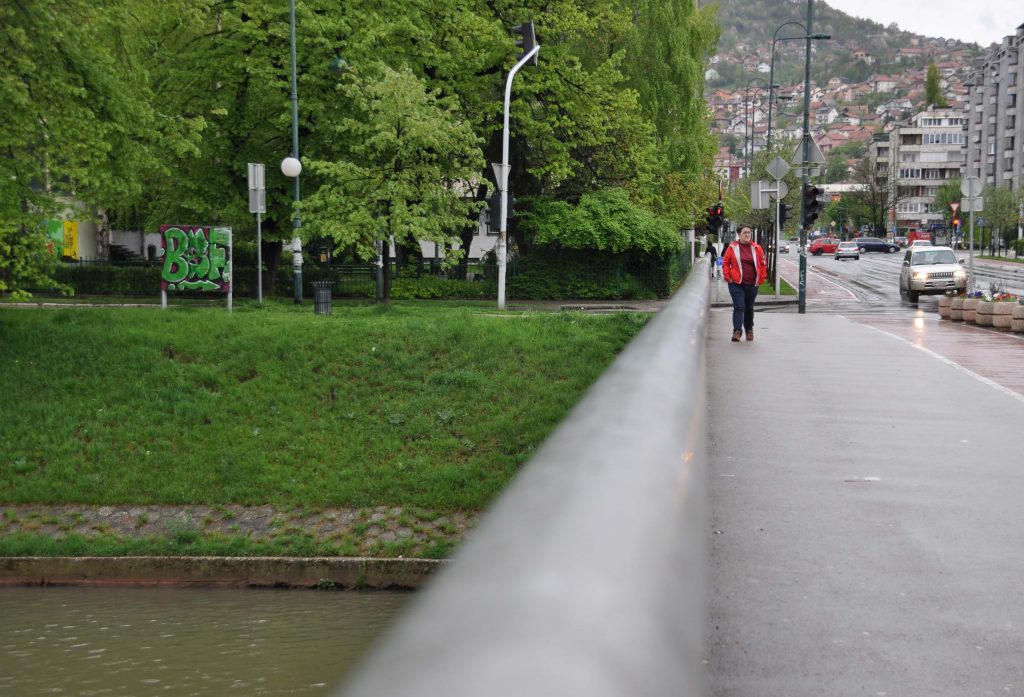
Half an hour later Lejla was on the bridge. 14 years old. Sixty steps. Walking between two worlds that used to be one just two years ago. „I passed the Serbian soldiers, then UN-soldiers and on the other side I was welcomed by Bosnian soldiers. It was confusing,“ she says about that day. Before the war there was no Serbian or Bosnian for Kalamujić. Just her family and Yugoslavia. „When I was young I did not even know that I had a Muslim name. To me we were all Yugoslavs, atheists and communists.“ Lejla’s mother was of Serbian origin, her father a Bosnian Muslim. She is the child of a mixed marriage. Before the war the term mixed marriage did not exist. People were just married.
On the other side of the bridge, the „the good side“ as she writes in her story „The Good, the Bad, and Kafka“, Kalamujić’s world did not become easier. Lejla’s father, whom she had not seen in two years, married again. Her half sister was born the next day. Lejla could not really reconnect with her father. They went for a walk in Vratnik. He told her about the people who had died or fled the city since the war broke out. It was a lot of people.
Kalamujić’s life got scattered a second time. This time the trigger was not a sudden heart attack, but a war that injured an entire country. What used to be one big piece missing in her life, now became many pieces spread out in the city and country she grew up in. „Evereything I knew about the world fell apart: my family, my home, my connections. I can’t put it back together again because some pieces are missing,” Lejla says.
One of these pieces is her grandparents’ apartment where she once was waiting to get to the other side of the city. Kalamujić writes about these two months in the story „The Good, the Bad, and Kafka“. Bored of waiting, she started to read books. One of them was Franz Kafka’s „The Trial”. In Kalamujić’s story Kafka knocks on the door while Lejla is waiting to cross the bridge. They sit down and have a conversation. „Where are we?” Kafka asks. „In Sarajevo,” Lejla replies. “Sarajevo?” “Grbavica!” she says. „It is war!” “Which one?” Kafka asks. Outside the apartment a grenade explodes. Kafka cringes. Lejla tells the visitor about the two sides of the city. About the snipers and the curtains drawn. They talk about „The Trial”. „How could you write something like this? Let an innocent man suffer for no reason,” she asks Kafka. Then Kafka gets ready to leave the apartment.
Lejla still has the keys to the apartment. But the place does not belong to her family anymore. After the war her grandmother applied for ownership of the apartment. The state approved. The documents arrived two weeks after her grandmother’s death. The apartment, empty, dusty and belonging to no one, an allegory of the state of post-war Bosnia. It was here that Kalamujić wrote her first stories about her mother and where she waited during the war to see her father again. In this run down apartment full with memories two paths come together: The death of Lejla’s mother and the war that tore apart her family and Yugoslavia.
23 years after Kalamujić crossed the bridge, she looks out of the window of the apartment on Zagrebačka Street. She has not been here for a long time. A few things are spread on the floor: Boxes with books, a shabby green couch, a reading chair, clothes, old newspapers and a dirty mirror. „This does not belong to me,“ Lejla says and points to packages of rice and flour. „I don’t know who put this here. Maybe a neighbor.“ Her voice sounds like she wants to make sure that these items do not belong here. The rice and the flour are not part of her story. A story made out of many short stories she has chosen to write herself and put into her book.
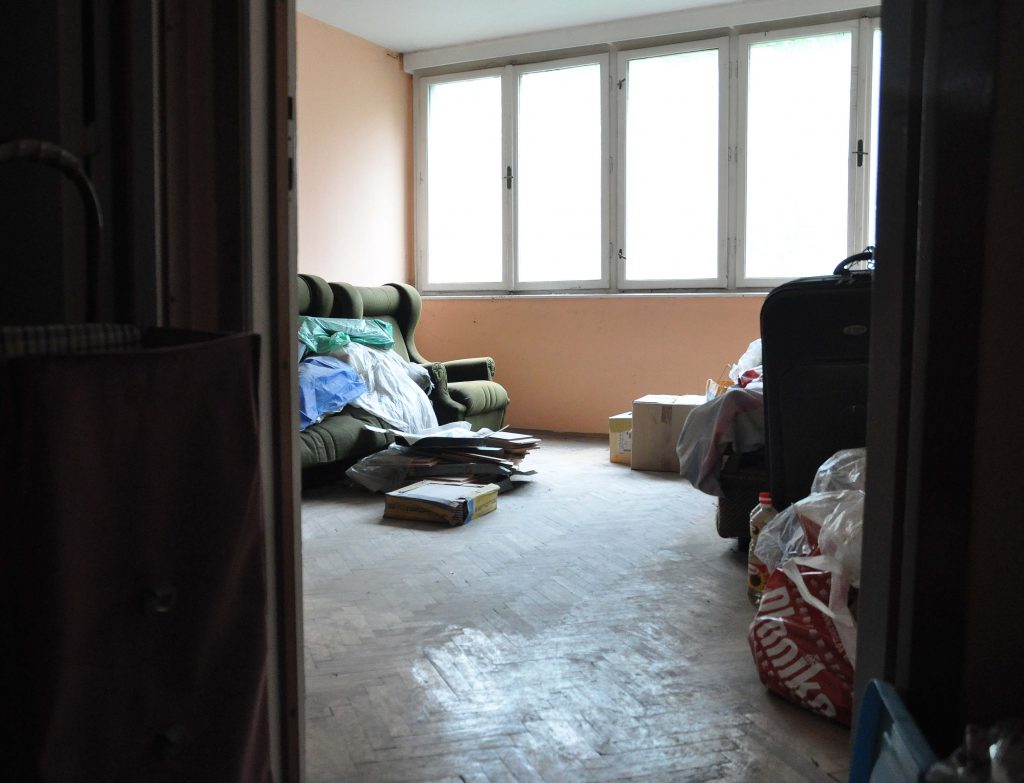
Unlike the day she crossed the bridge 23 years ago, it is a rainy day and the view is full with clouds. The bridge is only one kilometer away. A 10-minute walk. Next to the bridge is a small sidewalk that leads to a massive apartment block from the old Yugoslav times. It is the path to Kalamujić’s new home. She shares it with her girlfriend Naida.
Naida – glasses, medium length brown hair, casual clothes, laid back smile, feet on the ground – stops her car in second lane for Lejla to buy some cigarettes. There is a trust in their relationship and a sense of humor in Naida’s personality that has helped Lejla in finding her way as a writer. After panic attacks and a nervous breakdown at age 22, Lejla was not able to leave her home for one year. It seems to be no coincident that Leija’s beakdown happened at the same age when her mother died. At the time she lived with her grandparents at their apartment in Vratnik. In order to cope with her situation, she started to write more seriously. The outcome was her first book „The Anatomy of a Smile”. The collection of short stories was published in 2009 and deals with mental illness. During this time Naida came by Lejla’s house almost everyday. They became a couple and have been for the last 15 years.
„I live an openly lesbian life. But in Sarajevo it is very hard for gay people,“ Kalamujić says. Homosexuality – just like death and war wounds – is often lived in silence in Bosnia and Ex-Yugoslavia. „People expect you to hide your homosexuality. They are are shocked if you don’t.” In her story „Return to the Stars“ Lejla shows Naida the grave of her mother for the first time. „That sounds like a real work assignment,“ Naida laughs in the story when Lejla talks about how her grandmother used to distribute little jobs at the cemetery. Tearing out weeds, cleaning the gravestone, sweeping the paths and putting nylon around the grave to keep away the frost during winter. „You really put Nylon around the grave?“ Naida asks in „Return to the Stars“. „I nod. We both burst out in laughter,“ Lejla writes.
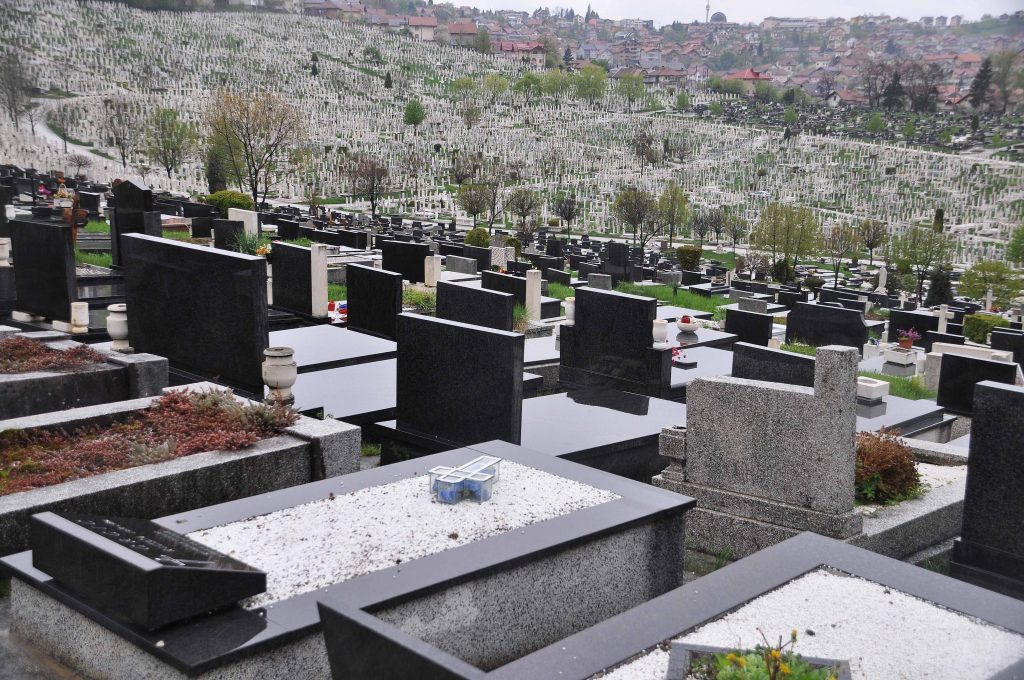
Since her nervous breakdown, Kalamujić has found the confidence to give a voice to the issues that are often left in silence in Bosnia. More than 30 years after the death of her mother, 20 years after the war and 10 years of her relationship it was time to put these places and issues in „Call me Esteban”.
Back at „Buybook” Lejla has put her book back into the shelf and gets ready to leave. She has an appointment at the Swiss embassy to get a visa for a writer-in-residence program in Switzerland. She will be gone for six months to work on her next book. A book about the difficult life of queer people in the Balkans in three epochs: during the Second World War, during socialist Yugoslavia and in the post-war countries today. Even though Lejla calls Sarajevo her home, she is unhappy with the state of the city and the country. „Many things are wrong here. Nationalism, poverty, fascism and politicians who live off division and fear. At the moment things are looking bad,“ she says.
VIDEO: Lejla about literature and LGBT in Sarajevo
But in her life, Kalamujić has overcome enough difficulties to not also have some hope inside of her. „Future generations will change things. I can see the light in the anger of the young people. It is not the time yet. But the ones who grew up after the war will want to put and end to this story of the past.“ For Lejla identity and community should not be based on ethnic belonging. What you do and what you care about should be more important than your last name. „I don’t consider myself Bosnian, Serbian or Croatian. I am against nationalism. I am still a Yugoslav and a socialist,” she says.
„Who are you? To whom do you belong?” At the end of the book we know more about where Lejla belongs. To a mother she has no memories of. To a family torn apart by war. To a girlfriend she shares a home with. To her life as a writer. To an injured country that has a hard time healing its wounds. But in between the lines „Call me Esteban” also poses these questions to the world around Lejla. Her answer: Go on your own journey and find out.
Photos by: Eva Mundos
The city: Sarajevo
During the 1980s the city known for its religious and cultural diversity experienced a decade filled with exciting sporting events, flourishing art scenes and a vibrant urban life. But the war brought this development to an abrupt end only a few years later. During the siege of the city, 11,541 people lost their lives, including over 1,500 children. An additional 56,000 people were wounded. Today, the capital of Bosnia and Herzegowina is slowly recovering and has a population of about 275,000.
The country: Bosnia and Herzegovina
The country declared independence from Yugoslavia on March 3, 1992. The following war killed more than 100,000 people and was ended with the Dayton agreement on December 14, 1995. Since then economic and political progress has been slow. Since the end of the war approximately 150,000 young Bosnians have left the country, and around 10,000 young people still leave the country each year.
In 2016 the unemployment rate was about 25 percent. Youth unemployment was even higher than 65 percent. Bosnia has a population of approximately 3,5 million people with an average salary of around 400 Euro. The political system of the country, which is based on ethnic identity since the war, is considered to be one of the world’s most complicated systems of government.
